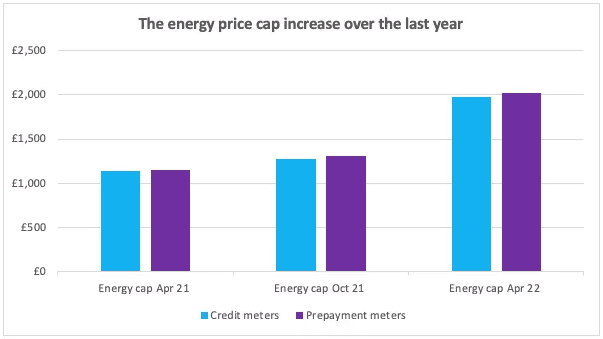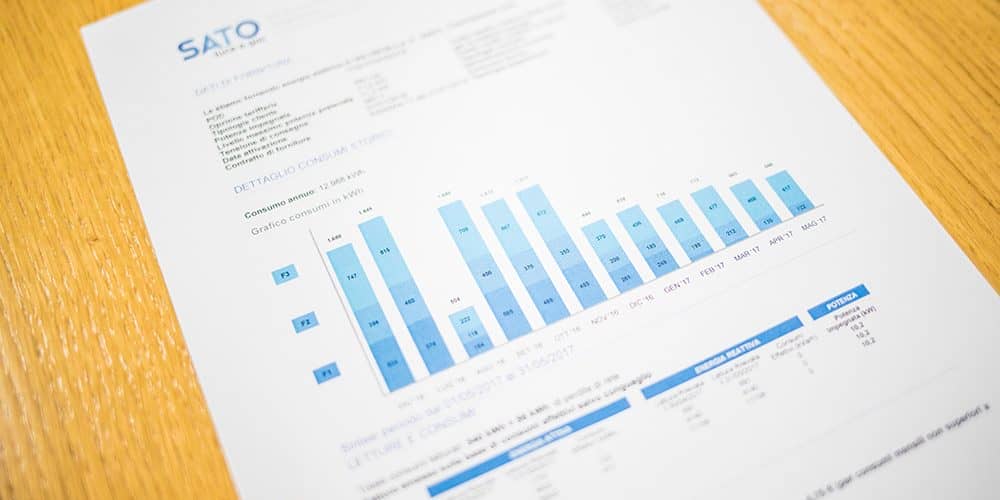On the 1 April 2022, the energy price cap increased again by a further 54% as the price of wholesale gas and electricity remains at an all-time high. This means that the average UK household paying in the region of £25 per week for energy will now pay about £37.50 if using the same amount of energy on a standard (variable) tariff. This bar chart by livingplus.co.uk clearly shows that the energy price cap has nearly doubled since April 2021:
 Source: livingplus.co.uk
Source: livingplus.co.uk
Mounting living costs have seen most of us reassess how much energy we use at home and work, and what changes we can make to reduce consumption. One of the simplest ways to make a big difference, is to take advantage of the off-peak times for electricity usage.
What are the peak and off-peak times for electricity
Energy suppliers often charge less for using electricity at certain times of the day or night. These off-peak hours are generally when the demand for power is low, such as while we are sleeping. This type of charging method is referred to as time of use tariffs. The exact times will be dependent on your chosen energy supplier, but typically off-peak times for electricity fall between 10pm and 8am. It is important to check times and if in fact, your energy supplier offers time of use tariffs in the first place. Unfortunately, many energy suppliers still charge a flat rate and therefore, it will not matter what time you put a wash on, the cost will be the same.
Time of use tariffs are also known as Economy 7 (offers 7 off-peak hours) and Economy 10 tariffs 10 (offers 10 off-peak hours) and are designed to give you a cheaper rate at night and a more expensive rate during daytime hours. When used properly, they could save you money, but whether you’ll benefit or not depends on your energy use habits. If you use most of your energy at night you should benefit for example, to charge an electric car, or you are able to set your appliances to come on at night. Things like washing machines, dishwashers, bread-makers can run over night to make the most of off-peak rates.
Whether or not an off-peak tariff is cheaper, will depend on the price of units and when you use power the most. If you are on an Economy 7 tariff for example, but use most of your electricity during the day, you could be paying more than you would on a normal type of tariff.
Have a good think about your energy habits, as a guide, comparethemarket.com estimates that “you would need to use roughly 40% of your energy at night and have electric storage heaters/electric car for an off-peak tariff to really be worthwhile. Storage heaters contain bricks that are warmed up overnight at cheap rates and then continue to release their heat during the next day. Some immersion heaters are also designed to be charged off-peak.”
How do I find out if I am on an off-peak tariff already?
If you are on a time of use tariff of some kind, your electricity bill will show both a day and a night rate. Your meter readings should also be obvious – meter may also have two dials (one for peak and one for off-peak). For clarification, consider calling your supplier or consulting a local electrician to optimise your electricity usage.
How can I cut the cost of my electricity?
If a time of use type tariff doesn’t fit the bill for you and your energy usage habit, don’t worry. There are still plenty of easy ways you can save cut down your energy bills.
- Unplug your laptop once you have shut it down. Sounds basic, but you will be surprised how many people leave it plugged into the mains after they have finished their days work. According to The New York Times, always leaving a laptop computer plugged in, even when it’s fully charged, can use around 4.5 kilowatt-hours of electricity in a week, or about 235 kilowatt-hours a year (depending on model and battery).
- Banish your tumble dryer. Invest in a clothesline – you’ll save a fortune.
- Only charge your phone if you need to. When your phone is 100% charged, unplug it.
- Do not leave gadgets or appliances on standby. Unplug appliances that have that little flashing standby light – TV’s, PlayStations, DVD recorders, kettles and microwaves are all common culprits that can easily be turned off before going to bed or go on holiday.
See our sustainable living ideas at home blog for more great suggestions on saving money and becoming more energy efficient.
If you haven’t already considered it, you may want to switch to a smart meter in order to help you monitor you power use better. Most of the big suppliers will change a meter for free, but make sure you check this is the case. Alternatively, you may benefit from switching to a supplier who will.
To explore options for a smarter energy solution, get free quotes from Maintracts Services. We are here to guide you in optimising your energy consumption. Don’t hesitate to contact us for personalised assistance!


